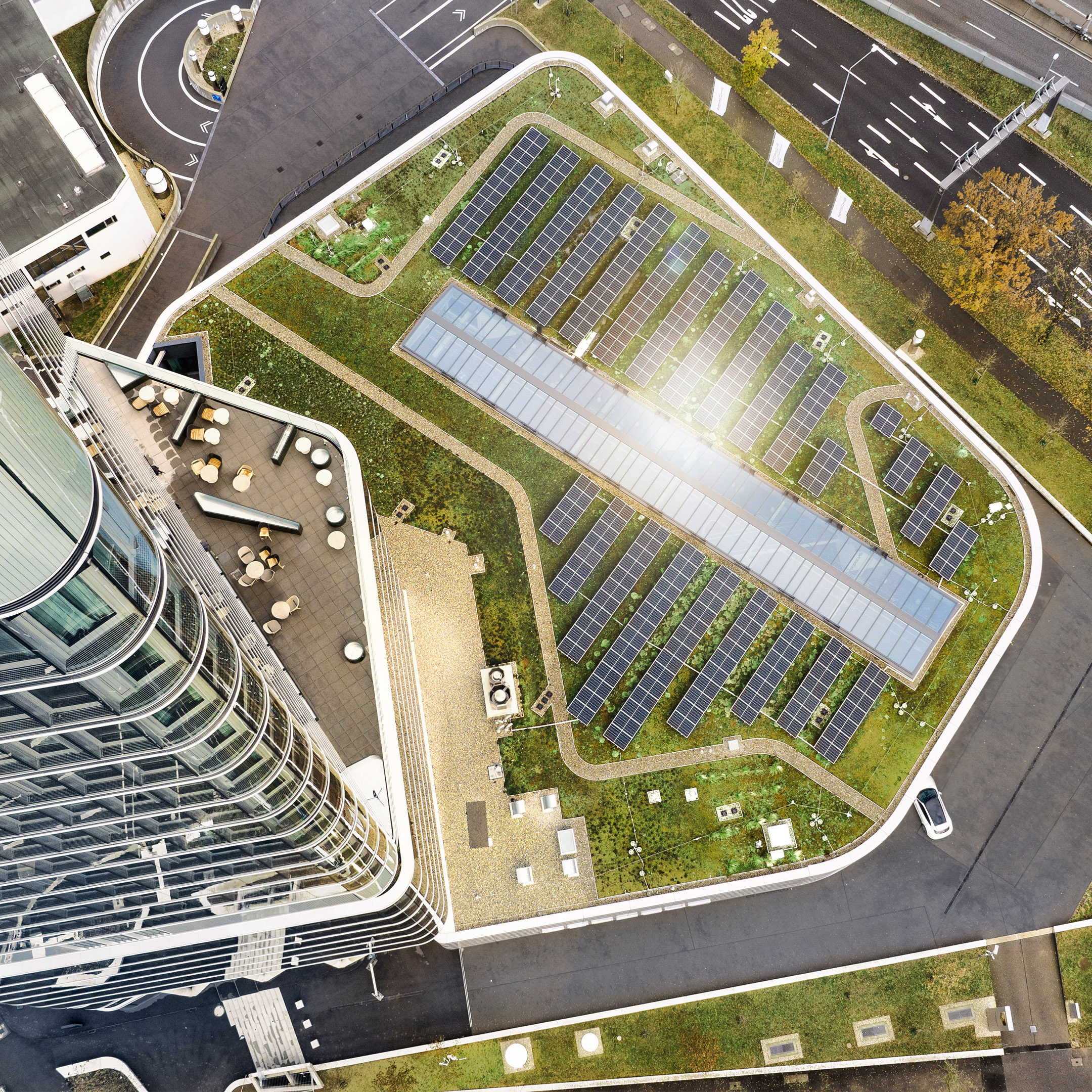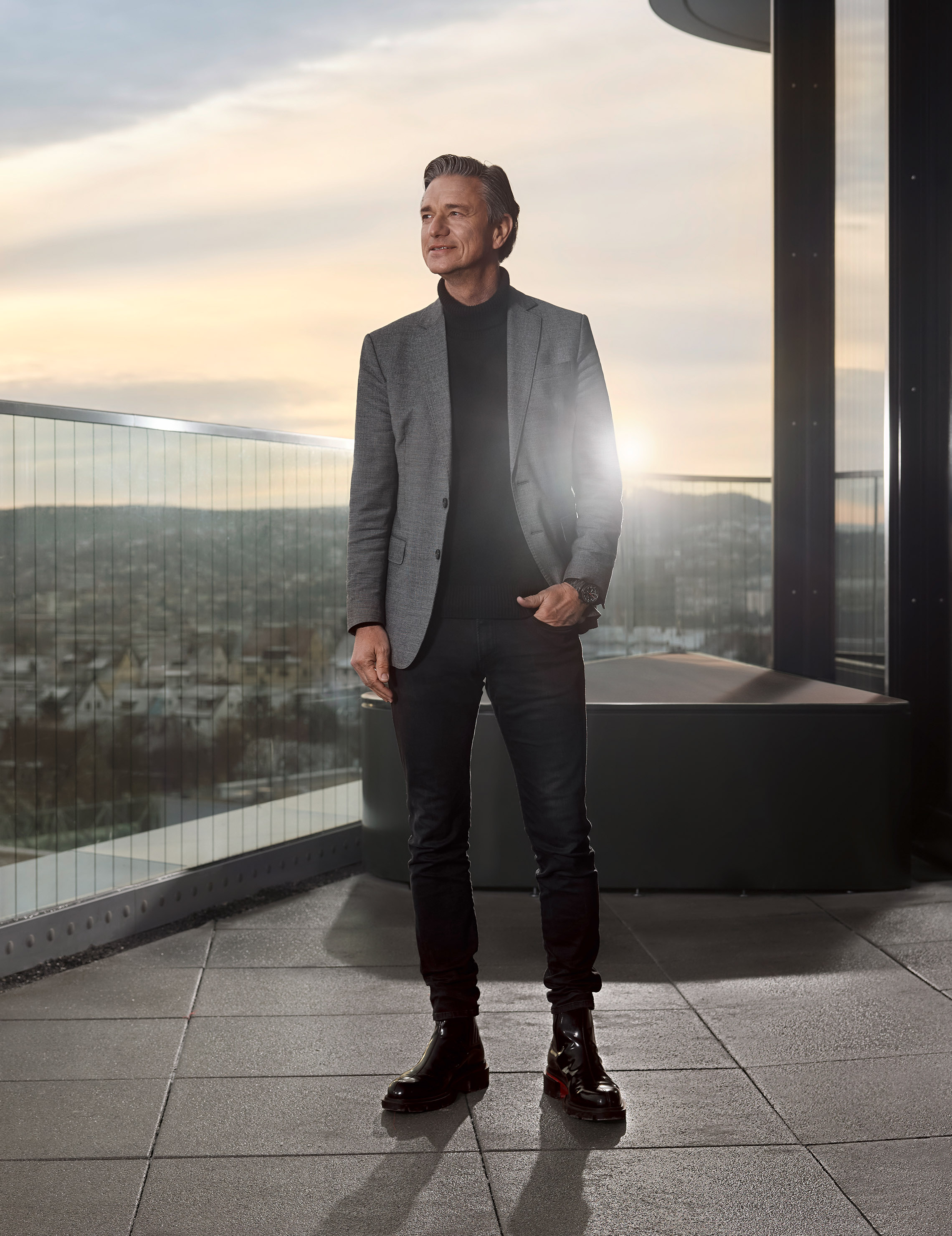In May 2023, Lutz Meschke and Philipp Schröder got together in person for the first time. The Deputy Chairman of the Executive Board and Member of the Executive Board, Finance and IT at Porsche AG welcomed the cofounder and CEO of cleantech start-up 1KOMMA5° to his office in Stuttgart-Zuffenhausen. The two of them turned up with their own personal expectations and, within an hour, were both pleasantly surprised—and on first-name terms.
“Philipp is young, dynamic, self-confident, and impressive. He’s very good at structuring complicated issues and knows how to explain things clearly,” says Meschke, full of praise. “Lutz’s office is much smaller and more modest than I was expecting,” adds Schröder. “I really enjoyed the meeting. It was much less complicated than I thought it would be.”
They appeared to hit it off. Both of them are entrepreneurs through and through and have demonstrated foresight time and again. Meschke is considered to be the father of venture capital activities at Porsche and in 2016 demonstrated courage and pioneering spirit when he pursued and initiated the first steps into the world of venture capital. “As I’ve always said, you should never measure these activities by the value of the individual companies,” he says, thinking back to when it all began seven years ago. “It’s also clear that not all investments in start-ups will ultimately take off. The most important thing is strategic added value for Porsche. We’ve learned a whole lot and have incorporated a great many products, technologies, and agile working methods into the Group very rapidly.”

Standing on the terrace of the Porsche Design Tower in Stuttgart, Meschke looks out over the rooftops of the city, satisfied with the progress made thus far. “Our VC activities have paid off both strategically and financially. They generate important ideas in innovation—and have already helped increase the value of the company.” Porsche has invested approximately €300 million in 50 different start-ups, with an investment book value at just under €400 million.
One example from the start-up portfolio is Schröder’s 1KOMMA5°, which Porsche got involved in at the end of 2021. Two years later, the Hamburg company is one of multiple success stories in venture capital that Lutz Meschke can cite.
Venture capital activities refer to the acquisition of a minority interest in start-ups, which are recently established and new companies, with a distinction made between traditional venture capital (VC) and what’s known as corporate venture capital (CVC).
In the case of VC, an external, independent investment team collects funds to invest in new companies. The aim of VC funds like these is to sell the investments for a profit after the value of the company has increased.
In the case of CVC, a traditional industry company acts as investor. This corporate investment team should fulfill the financial expectations associated with the investment and strategically increase value. Through this investment, the investing company is largely interested in accessing new technology and business models and gaining a new understanding of entrepreneurship.

These are precisely the objectives pursued by Porsche Ventures, the CVC unit of Porsche AG, which has defined four strategic fields of investment: Car & Mobility, Intelligent Enterprise, Sustainability, and Beyond. Porsche Ventures has been able to operate independently for the most part since 2023. “That allows us to make the transaction process more efficient,” says Ulrich Thiem, Managing Director of Porsche Ventures. “And investments in start-ups provide us with earlier access to business ideas and technology concepts. Porsche Ventures acts as a sensor for Porsche in new, developing markets and will therefore also fulfill the company’s strategic duties in the future.”The involvement of a CVC unit additionally benefits the start-ups, which not only receive new capital, but also gain access to industrialization expertise, marketing know-how, and initial orders from the industry.
When Porsche conquered the world of venture capital in 2016, Meschke’s approach was modern and global, with Porsche initially investing in international VC funds. Porsche Ventures is now involved in multiple funds with a focus on the US, Europe (e.ventures), and Israel (Magma and Grove). Porsche has also invested in the CVC unit of a Chinese car manufacturer, NIO Capital. “Through fund investments, we also wanted to learn how the VC world operates on a fundamental level,” explains Thiem.
Meschke refers to the period between 2016 and 2022 as “the first generation of our venture capital activities.” During this phase, Porsche invested directly in 39 new companies and financed the establishment of 13 companies by Forward31, the company builder by Porsche Digital. Five of these investments have already been sold.
Through Porsche Ventures, we are creating the basis for convincing external investors of our innovation agenda and our investment strategy in the future. Lutz Meschke, Deputy Chairman of the Executive Board and Member of the Executive Board responsible for Finance and IT
The most prominent investment at that time was Rimac Automobili, which is now the Rimac Group. In 2018, Porsche got involved with the Croatian hypercar manufacturer—and developed the company into a strategic investment with unicorn status. A unicorn is a company valued at US$ 1 billion or more. Following multiple financing rounds, Porsche now holds 20 percent of the Rimac Group, which is a Porsche partner in the joint venture Bugatti Rimac. Rimac Technology is also well on its way to becoming a Tier 1 supplier for Porsche.
Meschke could imagine a similar collaboration with Hamburg start-up 1KOMMA5°, which offers heat pumps, solar modules, battery storage, and charging stations for electric cars, preferably as part of a package and intelligently connected.
Meschke and Schröder met on a regular basis through the “Porsche Executive Champions” program, which encourages each member of the Porsche Executive Board to connect one on one with a start-up founder once a quarter to share contacts, tips, and good ideas—ideally in both directions.
“Through the investment in 1KOMMA5°, we’ve secured a partner that can help us enormously with the electric mobility transformation,” explains Meschke. He’s quick to emphasize that he and Schröder have concrete ideas for collaboration. But they won’t speak about them publicly until they’re ready for the market.
Porsche also recently invested in more established companies that already offer high strategic relevance for the luxury brand: Group14 Inc. and HIF Global LLC. “Thanks to the investment in Group14, we now have access to a strong supplier of battery cell chemicals for our Cellforce Group. We wouldn’t have been able to do that without our VC experience,” says Meschke. The same could be said of the early partnership with HIF Global LLC, one of the most promising actors in renewable synthetic fuels, known as eFuels.
Areas of focus
Porsche Ventures has defined four strategic fields of investment
Leaning against the railing on the terrace of the Porsche Design Tower, Meschke looks back at seven successful years. “Rather than resting on our laurels, we plan to continue along this path,” he emphasizes. The operational headquarters of Porsche Ventures were relocated to Luxembourg in early 2023. “In this way, we’re highlighting the independence of our VC activities,” he continues. “And we’re creating a foundation that will one day also allow us to attract external investors with our innovation agenda and investment strategy.”
His gaze turns to the vineyards of Stuttgart, as if he has spotted another unicorn there. “We have a lot of future plans for Porsche Ventures,” he says once again. In the coming years, Porsche plans to invest up to €250 million of venture capital, some of which will come from the profits from the first generation of the Porsche Ventures portfolio.
The funds seem to be well invested, and the next unicorn is likely just around the corner.
